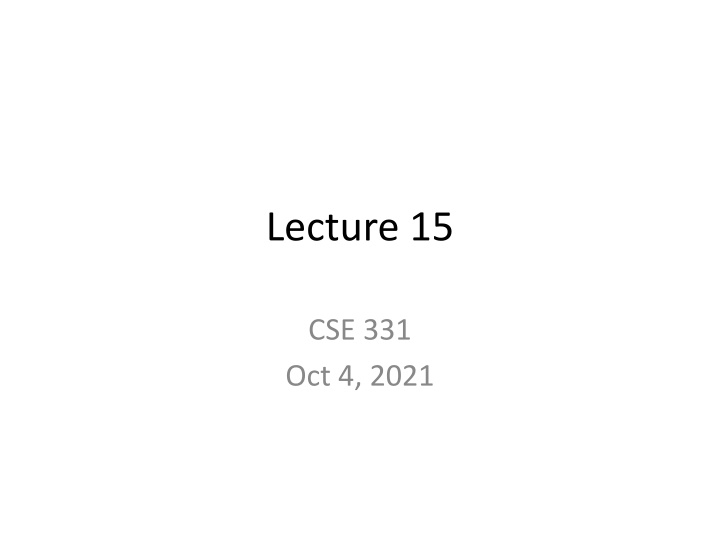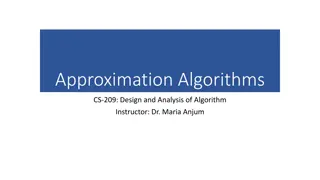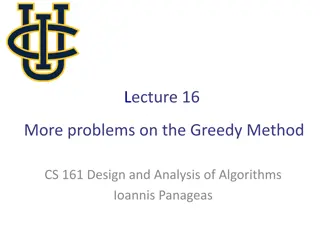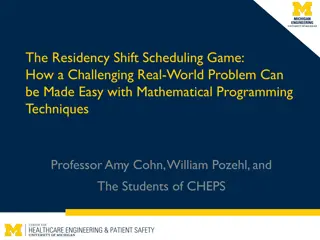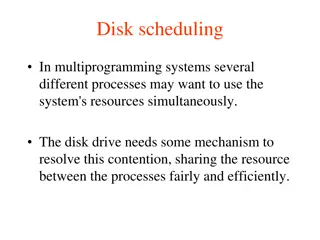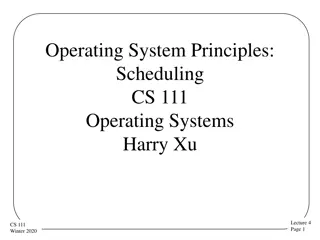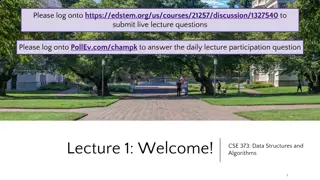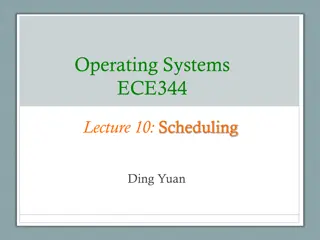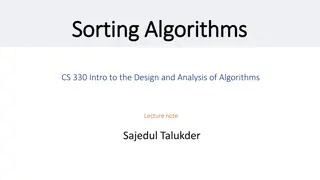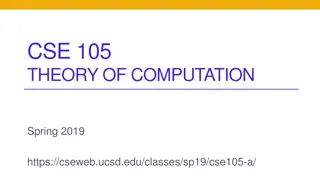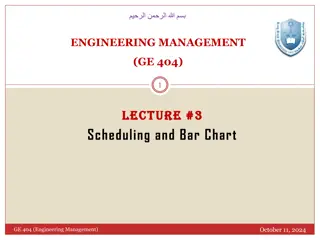CSE 331 Lecture Highlights: Scheduling Problems, Algorithms, and Examples
Dive into the world of interval scheduling problems, algorithms, and practical examples in this CSE 331 lecture. Explore how to maximize schedule efficiency, avoid conflicts, and optimize task management. Get ready for Quiz 1 and mid-term posts while staying engaged with project groups and feedback sessions.
Download Presentation

Please find below an Image/Link to download the presentation.
The content on the website is provided AS IS for your information and personal use only. It may not be sold, licensed, or shared on other websites without obtaining consent from the author.If you encounter any issues during the download, it is possible that the publisher has removed the file from their server.
You are allowed to download the files provided on this website for personal or commercial use, subject to the condition that they are used lawfully. All files are the property of their respective owners.
The content on the website is provided AS IS for your information and personal use only. It may not be sold, licensed, or shared on other websites without obtaining consent from the author.
E N D
Presentation Transcript
Lecture 15 CSE 331 Oct 4, 2021
Interval Scheduling Problem Input: n intervals [s(i), f(i)) for 1 i n { s(i), ,f(i)-1 } Output: A schedule S of the n intervals No two intervals in S conflict |S| is maximized
Example 1 No intervals overlap
Algorithm? No intervals overlap R: set of requests Set S to be the empty set While R is not empty Choose i in R Add i to S Remove i from R Return S*= S
Example 2 At most one overlap/task
Algorithm? At most one overlap R: set of requests Set S to be the empty set While R is not empty Choose i in R Add i to S Remove all tasks that conflict with i from R Remove i from R Return S*= S
Example 3 Task 5 Task 4 More than one conflict Task 3 Task 2 Task 1 Set S to be the empty set While R is not empty Choose i in R Add i to S Remove all tasks that conflict with i from R Return S*= S
Greedily solve your blues! Arrange tasks in some order and iteratively pick non- overlapping tasks Write up a term paper Party! Exam study 331 HW Project Saturday Sunday Monday Tuesday Wednesday
Making it more formal Task 5 Task 4 More than one conflict Task 3 Task 2 Task 1 Set S to be the empty set While R is not empty Associate a value v(i) with task i Choose i in R Add i to S Choose i in R that minimizes v(i) Remove all tasks that conflict with i from R Return S*= S
What is a good choice for v(i)? Task 5 Task 4 More than one conflict Task 3 Task 2 Task 1 Set S to be the empty set While R is not empty Associate a value v(i) with task i Choose i in R that minimizes v(i) Add i to S Remove all tasks that conflict with i from R Return S*= S
v(i) = f(i) s(i) Task 5 Task 4 Smallest duration first Task 3 Task 2 Task 1 Set S to be the empty set While R is not empty Choose i in R that minimizes f(i) s(i) Add i to S Remove all tasks that conflict with i from R Return S*= S
v(i) = s(i) Task 5 Task 4 Earliest time first? Task 3 Task 2 Task 1 Set S to be the empty set So are we done? While R is not empty Choose i in R that minimizes s(i) Add i to S Remove all tasks that conflict with i from R Return S*= S
Not so fast. Task 5 Task 4 Earliest time first? Task 3 Task 2 Task 1 Task 6 Set S to be the empty set While R is not empty Choose i in R that minimizes s(i) Add i to S Remove all tasks that conflict with i from R Return S*= S
Pick job with minimum conflicts Task 5 Task 4 Task 3 Task 2 Task 1 Task 6 Set S to be the empty set While R is not empty So are we done? Choose i in R that has smallest number of conflicts Add i to S Remove all tasks that conflict with i from R Return S*= S
Nope (but harder to show) Set S to be the empty set While R is not empty Choose i in R that has smallest number of conflicts Add i to S Remove all tasks that conflict with i from R Return S*= S
Task 7 Task 5 Task 4 Task 17 Task 18 Task 3 Task 2 Task 15 Task 16 Task 1 Task 12 Task 14 Task 13 Task 10 Task 11 Task 9 Task 8 Task 6 Set S to be the empty set While R is not empty Choose i in R that has smallest number of conflicts Add i to S Remove all tasks that conflict with i from R Return S*= S
Algorithm? Task 7 Task 5 Task 17 Task 4 Task 18 Task 3 Task 2 Task 15 Task 16 Task 1 Task 12 Task 14 Task 13 Task 10 Task 11 Task 9 Task 8 Task 6 Set S to be the empty set While R is not empty Choose i in R that minimizes v(i) Add i to S Remove all tasks that conflict with i from R Return S*= S
Earliest finish time first Task 7 Task 5 Task 17 Task 4 Task 18 Task 3 Task 2 Task 15 Task 16 Task 1 Task 12 Task 14 Task 13 Task 10 Task 11 Task 9 Task 8 Task 6 Set S to be the empty set While R is not empty Choose i in R that minimizes f(i) Add i to S Remove all tasks that conflict with i from R Return S*= S
Find a counter-example? Task 7 Task 5 Task 17 Task 4 Task 18 Task 3 Task 2 Task 15 Task 16 Task 1 Task 12 Task 14 Task 13 Task 10 Task 11 Task 9 Task 8 Task 6 Set S to be the empty set It While R is not empty works! Choose i in R that minimizes f(i) Add i to S Remove all tasks that conflict with i from R Return S*= S
Todays agenda Prove the correctness of the algorithm
Final Algorithm R: set of requests Set S to be the empty set While R is not empty Choose i in R with the earliest finish time Add i to S Remove all requests that conflict with i from R Return S*= S
